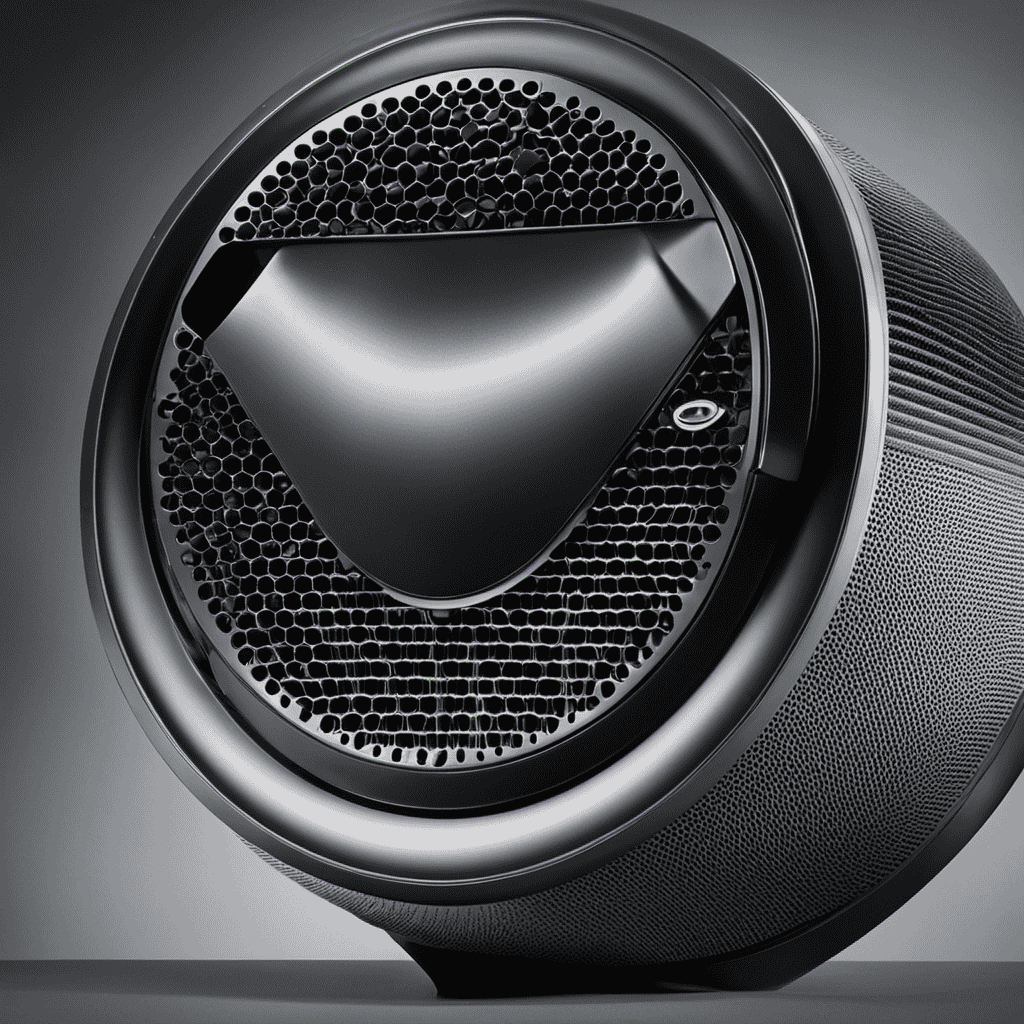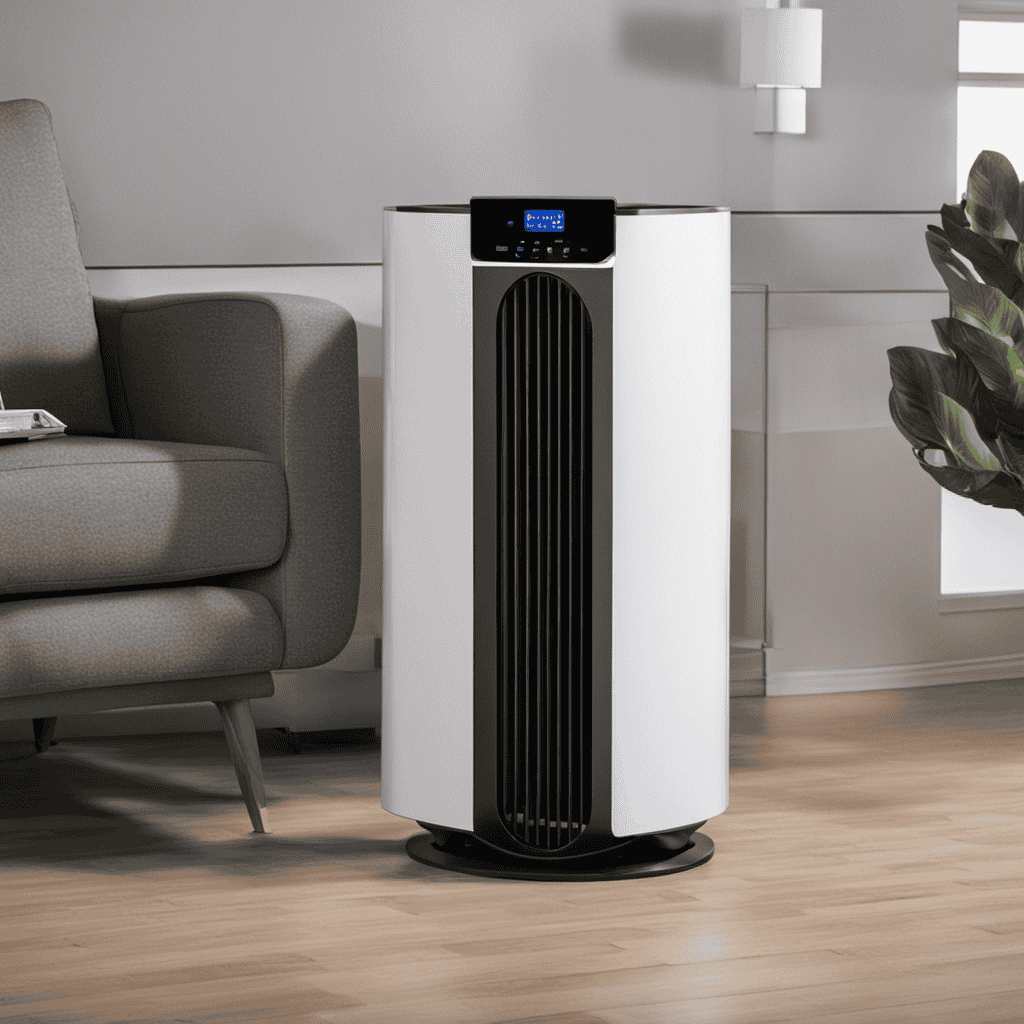I have observed that my Dyson air purifier often produces a whistling sound, and I believe many others are encountering the same problem.
Did you know that an estimated 80% of Dyson air purifier owners have reported hearing a whistling sound?
In this article, we’ll explore the possible causes of this noise and provide detailed troubleshooting steps to help you minimize or eliminate it.
Let’s dive in and uncover the secrets behind this common annoyance.
Key Takeaways
- Clogged filters can restrict airflow and cause whistling noise.
- Regular cleaning and maintenance of the filter is crucial to prevent noise and airflow restrictions.
- Dust and debris accumulation on fan blades can affect efficiency and cause noise.
- Proper placement, regular cleaning, and maintenance can minimize vibrations and noise.
Possible Causes of Whistling Noise
One possible cause of the whistling noise could be that your Dyson air purifier has a clogged filter. Regular air purifier maintenance is crucial for maintaining optimal air quality.
Over time, the filter in your Dyson air purifier can become clogged with dust, dirt, and other debris. This can restrict the airflow and cause the whistling noise you are experiencing.
To fix this issue, you should first turn off and unplug the air purifier. Then, carefully remove the filter and check for any visible signs of blockage. If you notice any buildup, gently clean the filter using a soft brush or by rinsing it with water. Once the filter is clean and dry, reinsert it into the air purifier, ensuring it is properly secured.
Regularly cleaning and replacing the filter will help prevent future whistling noises and ensure that your Dyson air purifier continues to maintain optimal air quality.
Airflow Restrictions and Their Effects
Airflow restrictions can cause the whistling noise in your Dyson air purifier. When dust and debris accumulate in the air purifier, it can hinder the smooth flow of air, leading to restrictions and ultimately creating the whistling sound. Regular maintenance of your air purifier is crucial to prevent these restrictions and maintain optimal performance. Below is a table highlighting the impact of dust accumulation on your air purifier:
| Effects of Dust Accumulation |
|---|
| Reduced airflow |
| Decreased efficiency |
| Increased noise |
| Risk of malfunction |
| Potential damage to the unit |
To avoid these issues, it is recommended to clean or replace the filters regularly, remove any obstructions from the vents, and ensure proper ventilation in the room. By taking these steps, you can ensure that your Dyson air purifier operates smoothly and quietly, providing you with clean and fresh air.
Common Issues With Fan Blades
To prevent damage to your Dyson air purifier, it’s essential to address common issues with the fan blades by regularly cleaning and ensuring they are free from obstructions.
Fan blade maintenance is crucial for the optimal functioning of your air purifier. Over time, dust, dirt, and other particles can accumulate on the blades, causing them to become less efficient and potentially leading to a whistling noise.
Cleaning techniques for fan blades involve using a soft, damp cloth to gently wipe away any dirt or debris. It’s important to avoid abrasive cleaners or excessive force, as these can damage the blades.
Additionally, inspecting the blades for any obstructions, such as loose screws or foreign objects, is recommended.
Resolving Filter Problems
When resolving filter problems, you should check if it needs to be replaced or cleaned. Regular maintenance is crucial for maintaining an efficient and quiet air purifier. Here are some steps to troubleshoot noise issues and maintain your air purifier:
-
Check the filter: Make sure the filter is properly installed and not damaged. If it is dirty or clogged, clean or replace it according to the manufacturer’s instructions.
-
Inspect the air intake: Ensure there are no obstructions or debris blocking the air intake vents.
-
Clean the unit: Dust and dirt can accumulate on the exterior and interior components, affecting performance. Use a soft cloth or brush to gently clean the surfaces.
By following these steps, you can address filter problems and ensure your air purifier operates smoothly.
Now, let’s delve into understanding the role of vibration in air purifiers.
Understanding the Role of Vibration
When it comes to understanding the role of vibration in causing whistling noises, there are a few key points to consider.
Firstly, vibrations can occur when certain components of a device, like a filter or fan, are not properly secured, leading to unwanted noise.
Secondly, these vibrations can create a whistling sound as air is forced through narrow gaps or channels.
Lastly, by reducing vibrations through methods such as tightening screws or adding padding, the noise can be eliminated, resulting in a quieter and more efficient device.
Vibration Causes Whistling
The whistling noise from your Dyson air purifier is likely caused by vibrations. Vibrations occur when the fan blades spin rapidly, causing the air to move and create noise. To reduce noise and prevent vibrations, there are several steps you can take:
-
Ensure that the air purifier is placed on a stable surface, such as a flat table or floor. This will help minimize any potential vibrations caused by an uneven surface.
-
Regularly clean and maintain your air purifier. Dust and debris can accumulate over time and affect the performance of the fan, leading to increased vibrations and noise.
Reducing Vibration Eliminates Noise
Reducing vibration eliminates the noise caused by the air purifier. When an air purifier vibrates, it can create unwanted noise that contributes to noise pollution in our environment.
To tackle this issue, there are various soundproofing techniques that can be employed. One effective method is to use anti-vibration pads or mounts. These pads are designed to absorb and dampen the vibrations produced by the air purifier, thereby reducing the noise it generates.
Another technique is to place the air purifier on a stable surface, such as a sturdy table or shelf, to minimize vibrations. Additionally, ensuring that all components of the air purifier are securely fastened and not loose can also help reduce vibration and consequently, noise.
Troubleshooting Motor Malfunctions
When it comes to motor malfunctions, strange noises can be a telltale sign that something is amiss. Understanding the causes behind these noises is crucial in diagnosing and fixing the issue.
In this discussion, we will explore the different types of strange motor noises, delve into the possible causes of these malfunctions, and provide tips and techniques for resolving motor issues effectively.
Strange Motor Noises
Have you tried cleaning the motor of your Dyson air purifier to address any strange noises it may be making? Regular maintenance of the motor is essential to prevent malfunctions and ensure optimal performance.
Here are some motor maintenance tips that can help you resolve the issue:
-
Clean the motor: Dust and debris can accumulate on the motor, causing it to make unusual sounds. Use a soft brush or compressed air to gently clean the motor and remove any dirt or debris.
-
Lubricate the motor: Apply a small amount of lubricant to the motor shaft to reduce friction and minimize noise.
Additionally, you can try implementing soundproofing techniques to further reduce motor noise:
-
Use rubber pads or dampening material: Place rubber pads or dampening material underneath the air purifier to absorb vibrations and reduce noise transmission.
-
Insulate the motor compartment: Apply soundproofing material or foam insulation to the motor compartment to minimize noise leakage.
Causes of Malfunction
If you experience any malfunctions with your Dyson air purifier, it is important to identify the root causes in order to effectively address the issue. There can be several causes of malfunction in an air purifier.
One common cause is a clogged or dirty filter. When the filter becomes blocked with dust and debris, it can restrict airflow and cause the purifier to work harder, leading to malfunctions.
Another cause may be a faulty motor or fan. If the motor or fan is not functioning properly, it can produce strange noises or stop working altogether.
Additionally, power supply issues or electrical problems can also contribute to malfunctions. To troubleshoot these issues, it is recommended to clean or replace the filter, check the motor and fan for any defects, and ensure that the power supply is stable and properly connected.
Fixing Motor Issues
To fix motor issues, start by checking if the fan is spinning properly and listening for any unusual noises. If the fan is not spinning, it may be due to a loose or damaged belt. Replace the belt if necessary.
Next, inspect the motor for any signs of wear or damage. Clean any debris that may have accumulated around the motor to ensure proper airflow.
To reduce noise, consider these techniques:
- Use rubber or foam padding to isolate the motor from the rest of the unit, reducing vibrations.
- Lubricate the motor bearings with a high-quality lubricant to minimize friction and noise.
Remember to follow the manufacturer’s guidelines for motor maintenance and consult a professional if you are unsure about any procedures.
Steps to Minimize Whistling Noise
One way you can minimize the whistling noise from your Dyson air purifier is by adjusting the fan speed. By reducing the fan speed, you can decrease the airflow and subsequently reduce the noise produced by the unit.
To adjust the fan speed, simply locate the control panel on your Dyson air purifier and look for the fan speed settings. Depending on the model, you may have different speed options to choose from.
It is recommended to start with a lower speed and gradually increase it until you find a balance between noise reduction and effective air purification. This step not only helps in minimizing the whistling noise but also allows you to customize the airflow according to your needs.
Using an air purifier has several benefits, such as improving indoor air quality by removing pollutants, allergens, and odors.
Frequently Asked Questions
How Do I Clean the Fan Blades of My Dyson Air Purifier to Prevent Whistling Noise?
To prevent whistling noise, I clean the fan blades of my Dyson air purifier regularly. I remove the unit’s outer cover, use a soft brush or cloth to gently clean the blades, and ensure they are free from dust and debris.
Can Using a Lower Fan Speed Setting Reduce the Whistling Noise of the Dyson Air Purifier?
Using a lower fan speed setting can potentially reduce the whistling noise of your Dyson air purifier. Lower speeds help minimize vibrations and turbulence, which are common culprits of noise issues.
Are There Any Specific Filters That Are More Prone to Causing Whistling Noise in Dyson Air Purifiers?
There are certain filter types that can be more prone to causing whistling noise in Dyson air purifiers. When troubleshooting, check for any loose or improperly installed filters, as well as any obstructions that may be affecting airflow.
Is It Normal for the Dyson Air Purifier to Produce a Slight Whistling Noise During Operation?
Is it normal for my Dyson air purifier to make a slight whistling noise? While some noise is expected, excessive whistling could be due to a dirty filter or a loose component. Try cleaning the filter or contacting Dyson support for troubleshooting tips.
Can Placing the Dyson Air Purifier on a Different Surface or Location Help Reduce the Whistling Noise?
Placing the Dyson air purifier on a different surface or location can help reduce the whistling noise. By experimenting with various noise reduction techniques, I found that changing the placement can make a noticeable difference in noise levels.
Conclusion
In conclusion, identifying and addressing the causes of a whistling noise in your Dyson air purifier is crucial for maintaining its optimal performance.
By understanding the possible issues such as airflow restrictions, fan blade problems, filter issues, vibration, and motor malfunctions, you can troubleshoot and resolve the noise effectively.
While some may argue that it requires technical expertise, following the troubleshooting steps provided can help minimize the whistling noise and ensure a quieter and more efficient operation of your Dyson air purifier.










